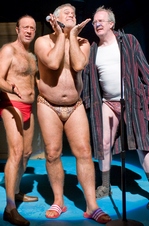SITE GUIDE
SEARCH
REVIEWS
FEATURES
NEWS
Etcetera and
Short Term Listings
LISTINGS
Broadway
Off-Broadway
NYC Restaurants
BOOKS and CDs
OTHER PLACES
Berkshires
London
California
New Jersey
DC
Philadelphia
Connecticut
Elsewhere
QUOTES
TKTS
PLAYWRIGHTS' ALBUMS
LETTERS TO EDITOR
FILM
LINKS
MISCELLANEOUS
Free Updates
Masthead
Writing for Us
A CurtainUp Review

(left to right) Yasen Peyankov, Scott Jaeck and Tracy Letts in
|
Richly quirky, contagiously whimsical and ultimately (and unexpectedly) rhapsodic, Enda Walsh’s 90-minute anti-epic retelling reprises Odysseus/Ulysses’ faithful (and mute) wife Penelope and the four remaining suitors. (There were once 100 but attrition has created a kind of survival of the fattest.) On a hot afternoon, on this island kingdom of Ithaca on the Ionian Sea, these four unpicturesque sun bathers desperately besiege this presumed widow with their final proposals.
The setting is a seaside palace where a quartet of now middle-aged men await her decision at the bottom of an empty swimming pool, with plastic chairs piled up on either side. High above, a picture window frames the elegant Penelope (beautiful Logan Vaughn), her physical perfection (and race) a cunning contrast to these pale slobs in Speedos. (As one says, “The mind remains but the body goes its own way.”)
In regal solitude, Penelope watches them on a wide-screen TV as they deliver their courtship proposal--until at the end, sensing the violent conclusion, she leaves the seaside retreat and stares pitiably at these doomed dreamers.
As they have for a decade, the foolish foursome are waiting and waiting and waiting for the slightest smile of favor. Inevitably their bored persiflage recalls Vladimir and Estragon as they mark time before Godot’s much-postponed appointment. But Odysseus’ terrible return is horrifically inevitable. The men know it: Each has had the same dream of the pool’s useless barbecue cooker suddenly erupting in flames. Worse, they know in advance the very specific ways in which the still muscular, ever young warrior (very different from these flabby wooers with their pot bellies and sagging faces) will carve them into unrecognizable carrion.
But the certainty of their demise gives a bittersweet poignance and a semblance of dignity to these four remaining palace invaders. (Odysseus’ faithful old dog and his handsome and hardbodied son Telemachus are neither seen nor mentioned.)
As much as they try to coordinate their efforts into a “company,” each yearns for the queen (here called “the prize”) with a defining pathos. Passive aggressive as he bumbles around the enclosure, Dunne (Scott Jaeck in oratorical overdrive) almost repents his siege of Ithaca as he remembers the innocent 10-year-old he once was and for whom everything around him was both too much and just enough.
When he’s not reading (Homer—no less), Fitz (Tracy Letts replacing John Mahoney) hopes to seduce Penelope with a soaring proclamation of his own nothingness before the one true reality—his hope for her future. Burns (Ian Barford), the most forlorn of the four, mixes his pretended passion for Penelope (“fight to let love win”) with his real remorse over the loss of Murray, a former suitor and kindly soul whose suicide is only supposed.
Presumably the men’s best hope for success, Quinn (Yasen Peyankov, a wily actor who detonates as often as he deceives) lacerates his competitive colleagues, declaring that “they’re on to themselves” or at least he is. Quinn is the master manipulator of the bunch: His weird appeal to Penelope is to make rapid-fire costume changes to depict Napoleon and assorted storybook characters. But his speeches congeal with a gospel of predation and hate. His real craving is destruction, a hunger that ultimately slays him before the others.
As the barbecue suddenly explodes with smoke and flames engulf the palace, Odysseus’ fated attack (which in Homer is actually secretive and stealthy) ends the story. Before this dreamed demise Walsh makes us see these suitors as very different creatures from the scum who Homer depicted as war-shirking cowards, misogynistic parasites, vile squatters and would-be rapists. Walsh’s last lovers are sad souls. They confront their own physical deterioration with an ardent, even sincere, passion for Penelope that ultimately redeems their imminent and bloody deaths.
But even at 90 minutes, Penelope has its longueurs. Sometimes Walsh’s depiction of boredom too easily passes for the real thing. Still, these four aging actors deserve distinguished conduct awards for baring their diminishing returns so unflinchingly before paying audiences. (A 30% body fat ratio is the best you can hope for here.) Amy Morton’s surefire staging manages to make most of the moments matter: We discover that every step these guys take is part of an elaborate dance of death as they--almost graciously--embrace their fate.
| Penelope by Enda Walsh
Director: Amy Morton Cast: Ian Barford (Burns), Tracy Letts (Fitz) and Yasen Peyankov (Quinn) with Scott Jaeck (Dunne) and Logan Vaughn (Penelope). Sets: Walt Spangler Costumes: Ana Kuzmanic Lights: James F. Ingalls Original music and sound: Rob Milburn & Michael Bodeen Steppenwolf Downstairs Theatre, 1650 N. Halsted St. Chicago, Ill www.steppenwolf.org from 12/01/11; opening 12/11/11; closing 2/05/12 Tickets: $20-$78 Reviewed by Lawrence Bommer |
|
REVIEW FEEDBACK Highlight one of the responses below and click "copy" or"CTRL+C"
Paste the highlighted text into the subject line (CTRL+ V): Feel free to add detailed comments in the body of the email. . .also the names and emails of any friends to whom you'd like us to forward a copy of this review. You can also contact us at Curtainup at Facebook , Curtainup at Twitter and at our Blog Annex |
|
Subscribe to our FREE email updates with a note from editor Elyse Sommer about additions to the website -- with main page hot links to the latest features posted at our numerous locations. To subscribe,
E-mail: esommer@curtainup.comesommer@curtainup.com
put SUBSCRIBE CURTAINUP EMAIL UPDATE in the subject line and your full name and email address in the body of the message -- if you can spare a minute, tell us how you came to CurtainUp and from what part of the country. |





